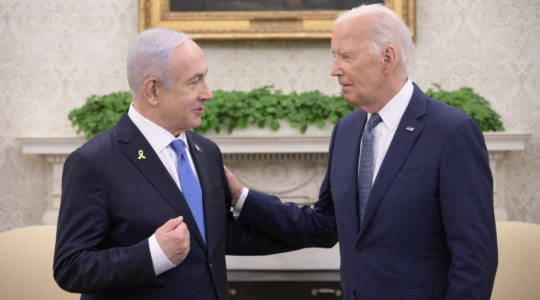JERUSALEM (JTA) — Few observers expected much to emerge from the March 11 summit between Prime Minister Ehud Olmert and Palestinian Authority President Mahmoud Abbas. But just hours before the meeting, Olmert dropped a bombshell that took even members of his own Cabinet by surprise: He intimated that Israel was seriously considering a Saudi-initiated Arab peace plan. Olmert’s statement placed the meeting with Abbas in a totally different context. Instead of measured confidence-building steps, the focus was on the ambitious Arab proposals for a final peace deal between Israel and the Palestinians, and with the wider Arab world.There were other positives in the meeting: Abbas said he would try to secure the release of kidnapped Israeli soldier Cpl. Gilad Shalit before the establishment of a Palestinian national unity government, expected within the next few days. He and Olmert also agreed to meet again soon, probably in the West Bank city of Jericho.But no progress was reported on other key issues. Olmert rejected Abbas’ requests to lift Israeli roadblocks in the West Bank, release Palestinian prisoners from Israeli jails and extend a putative cease-fire in Gaza to the West Bank. Abbas, for his part, could not guarantee an end to Palestinian rocket fire on Israeli towns and villages near Gaza, nor a halt to arms smuggling into Gaza from Egypt. Nor could he promise Olmert that a Palestinian unity government would accept the international community’s three benchmark conditions for resuming direct financial aid: recognition of Israel, renunciation of violence and acceptance of past peace deals.By far the most important outcome of the meeting was that it underscored the growing relevance of the Arab peace plan. With other Israeli-Palestinian channels apparently blocked, Olmert and Abbas seem to be edging toward re-engagement on the basis of the Saudi initiative.The plan promises Israel peace with the Palestinians and the entire Arab world in return for withdrawal to the pre-1967 Six-Day War borders and resolution of the Palestinian refugee question.First approved by the Arab League in Beirut in 2002, the plan is expected to be reaffirmed in an Arab League summit in the Saudi capital of Riyadh at the end of the month.The big question is whether the plan will be amended in ways that make it acceptable to Israel. For instance, the plan currently is ambiguous on the demand for a “right of return” to Israel for millions of Palestinian refugees and their descendants, something that virtually all Israelis see as code for the destruction of Israel through demographic means. Over the past several weeks there have been persistent reports of discreet Israel-Saudi-U.S. contacts aimed at producing a revised text. Prince Bandar bin Sultan, the Saudi national security chief, is said be the man in the middle. Israel is demanding that the plan provide for a refugee return only to a future Palestinian state, not to Israel, and that there be room for negotiation on the territorial issue. Some Arab states, such as Syria, have argued that the plan should be presented to Israel as a take-it-or-leave-it ultimatum that is not open to amendment.In his statement to the Cabinet on Sunday, Olmert gave the impression that at least some progress had been made. “We very much hope the meeting of the Arab leaders in Riyadh will reaffirm the positive elements in the Saudi initiative and perhaps strengthen the chances for negotiations between us and the Palestinians,” he declared. “The Saudi initiative is something that we will be ready to relate to seriously.”Despite Olmert’s upbeat tone, much skepticism remains in Israel over whether the Saudi-initiated plan can really energize the long-dormant Middle East peace process.Academics like Guy Bechor, head of Middle Eastern studies at the Herzliya Interdisciplinary Center, doubt the Arab side will amend the plan to make it more realistic. The plan, he says, “is not aimed at Israel but at creating an Arab consensus. And to add something now that would undermine that consensus just doesn’t make sense.”Others point to Israeli, Palestinian and American weakness. Likud opposition legislator Yisrael Katz maintains that Olmert’s new peace initiative is no more than a function of his domestic troubles, a desperate attempt by an unpopular prime minister to save his job.Israeli spokesmen emphasize the inability of the Palestinian body politic, torn between the largely secular Fatah movement and the fundamentalist Hamas, to get its act together. Several pundits argue that for any Israeli-Palestinian negotiation to succeed, Washington would have to shepherd it through. But bogged down in Iraq and preoccupied with Iran, the United States may not be able to do so.Still, the fact that the debate is taking place shows some movement. Moreover, outside of the Israel-Saudi-U.S. triangle, Israeli and Palestinian interlocutors have been quietly exploring the Saudi option together. In the run-up to the Olmert-Abbas summit, Foreign Minister Tzipi Livni had several meetings with leading Palestinians on terms for re-engagement on the basis of the Saudi-initiated plan. Other regional players have been involved, too. During an early March visit to Washington, Jordan’s King Abdullah II tried, apparently with success, to sell the plan to President Bush.For the first time in years, genuine optimism exists on the Palestinian side. Sufyan Abu Zaida, a senior Fatah activist, declared that Israeli acceptance of the Saudi plan would be “a major step forward.”Israeli analysts agree that for good or for ill, accepting the Saudi plan would be extremely significant. It would mean dropping the staged “road map” approach of 2003, which requires the parties to fulfill their commitments at each stage before the peace process moves ahead, and moving directly to complex and potentially explosive negotiations over a final deal. “It is not certain that all the Israelis will be happy to know that the Saudi plan means leapfrogging the road map, which has become irrelevant, and going into accelerated negotiations straight for a permanent settlement,” political analyst Ben Caspit wrote in Ma’ariv.The Palestinians have always sought a way to jump straight to final-status talks without first dismantling their terrorist infrastructure, as the road map requires in its initial stage. Israel, for its part, chafed at the settlement restrictions in the road map’s opening phase but seeks the payoff the Saudi plan offers — peace, normalization and regional security. Whether or not these goals are attainable, pundits suggest that taking the Saudi road could prove irreversible. “Make no mistake, if Israel accepts the Saudi initiative, even only as the basis for negotiations, it will be taking a huge step toward the end of control over the territories — a step that even Olmert’s successors will have difficulty retracting,” analyst Aluf Benn wrote in Ha’aretz.Given these potentially ground-breaking developments, the little-heralded Olmert-Abbas meeting could turn out to have been a watershed in Middle Eastern affairs.

Help ensure Jewish news remains accessible to all. Your donation to the Jewish Telegraphic Agency powers the trusted journalism that has connected Jewish communities worldwide for more than 100 years. With your help, JTA can continue to deliver vital news and insights. Donate today.





